Edited Volumes by Giulia Bernard

Rivista di Estetica, 2024
Issue of «Rivista di Estetica» (LXIV, 86, 2/2024), edited by Giulia Bernard, Luca Illetterati, an... more Issue of «Rivista di Estetica» (LXIV, 86, 2/2024), edited by Giulia Bernard, Luca Illetterati, and Zdravko Kobe.
The concept of speculative thinking is in many ways ambiguous. First, the concept of ‘speculation’ refers, on the one hand, to philosophical research, i.e., to the need for philosophy to remain committed to ‘pure’ thought and not to bend to instances allogenous to conceptual ones, while, on the other hand, it refers to financial transactions, aimed at profiting from fluctuations in market prices.
Second, even within philosophical discourse, the term remains equivocal. At times, ‘speculation’ refers to an inquiry that - precisely by being merely speculative - seems detached from the practical concerns of the world, thereby indicating the essential theoretical element of philosophical inquiry; at others, the term marks the extreme experience of thinking in which ordinary discursiveness touches its limits. After a period of relative oblivion, the notion of the ‘speculative’ has returned today within contemporary philosophical debate.
This special issue focuses on the notion of ‘speculative thinking’, both in its Hegelian and neo-Hegelian interpretations and in contexts that partially diverge from that tradition, aiming to philosophically explore the term’s rich and varied meanings.
Table of contents:
Giulia Bernard, Luca Illetterati, Zdravko Kobe, Speculative thinking: An introduction
I. Speculative, speculative thinking, and dialectics
Gunnar Hindrichs, Il programma speculativo
Angelica Nuzzo, Speculative rationality and its dialectic: Thinking (in) the contemporary world
Quentin Meillassoux, Dialectique spéculative et spéculation non-dialectique. De l’usage d’une négation ésotérique dans l’oeuvre de Hegel
II. Speculative and language
Goran Vranešević, Speculative conception of thought: Hegel on language
Silvia Pieroni, La forma della proposizione speculativa tra scrittura filosofica e traduzione
III. Speculative, speculative materialism, and psychoanalysis
Giovanni Temporin, Meillassoux attraverso lo specchio. Sulla speculazione del materialismo speculativo
Alenka Zupančič, Lacan as speculative thinker?
https://www.rosenbergesellier.it/ita/titolo?ref=1711
«Verifiche», 2023
Special issue of «Verifiche» (LII, 2/2023), edited by Giulia Bernard and Barbara Santini.
Cont... more Special issue of «Verifiche» (LII, 2/2023), edited by Giulia Bernard and Barbara Santini.
Contributions by G. Bernard, L. Fonnesu, M. Glatzel, K. Hong, T. Mauri, B. Santini, S. Schick, M. Tangorra, P. Valenza, D. Vanden Auweele, Y. Xia.
The Introduction of the issue and the essays are available in open access at this link: http://www.verificheonline.net/riviste/reason-in-check-philosophy-of-religion-in-classical-german-philosophy/
Papers by Giulia Bernard

«Teoria. Rivista di Filosofia» , 2024
-- Essay Winner of the "Vittorio Sainati" Study Award 2024 --
In this paper, I aim to investigat... more -- Essay Winner of the "Vittorio Sainati" Study Award 2024 --
In this paper, I aim to investigate the nuanced role that writing, i.e. the act of articulating and conveying arguments and concepts through textual communication, plays within Kant’s philosophy, particularly in shaping the concept of philosophy and elaborating ways to participate in it. Central to my argument is the assertion that the issue of writing stands as a linchpin for comprehending the exceptionalism inherent in philosophy: the way in which inquiry in philosophy is somehow epistemologically different from inquiry in other disciplines. I show how such a specificity is inextricably intertwined with the ways philosophy is (not) learned. By scrutinizing Kant’s project to substantiate philosophy’s capacity to foster freedom, I contend that a comprehensive exploration of the role of writing is imperative. Through this lens, the interplay between dichotomous concepts – private/public, scholastic/cosmic, and Bildung/science – emerges as pivotal in elucidating philosophy’s exceptionalism and showing how it is linked to the broader Enlightenment-era inquiry concerning participation in critical, emancipatory endeavours.

«Rivista di Estetica» LXIV, 86, 2024
Introduction to the Issue of «Rivista di Estetica» (LXIV, 86, 2/2024), edited by Giulia Bernard, ... more Introduction to the Issue of «Rivista di Estetica» (LXIV, 86, 2/2024), edited by Giulia Bernard, Luca Illetterati, and Zdravko Kobe.
The concept of speculative thinking is in many ways ambiguous. First, the concept of ‘speculation’ refers, on the one hand, to philosophical research, i.e., to the need for philosophy to remain committed to ‘pure’ thought and not to bend to instances allogenous to conceptual ones, while, on the other hand, it refers to financial transactions, aimed at profiting from fluctuations in market prices. Second, even within philosophical discourse, the term remains equivocal. At times, ‘speculation’ refers to an inquiry that - precisely by being merely speculative - seems detached from the practical concerns of the world, thereby indicating the essential theoretical element of philosophical inquiry; at others, the term marks the extreme experience of thinking in which ordinary discursiveness touches its limits. After a period of relative oblivion, the notion of the ‘speculative’ has returned today within contemporary philosophical debate. This special issue focuses on the notion of ‘speculative thinking’, both in its Hegelian and neo-Hegelian interpretations and in contexts that partially diverge from that tradition, aiming to philosophically explore the term’s rich and varied meanings.
https://www.rosenbergesellier.it/ita/titolo?ref=1711
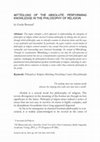
«Verifiche» , 2023
This paper attempts a fresh approach to understanding the emergence of philosophy of religion wit... more This paper attempts a fresh approach to understanding the emergence of philosophy of religion within classical German philosophy by delving into the process through which philosophy came to critically examine its discursive forms and the ways it was performed and transmitted. In particular, the paper explores several models of philosophy of religion centered around a key concept that proves pivotal in reshaping rationality and transcending mere historical knowledge: the concept of Mitteilung. Through its examination, Mitteilung is revealed as not only the self-expression of communicated content but also as a transformative experience for both philosopher and audience, challenging the philosophical discourse itself. This investigation points out a fundamental meta-philosophical gradient of philosophy of religion, indicating its emergence within diverse endeavors to develop a cosmic rather than scholastic philosophy in the world.
«Verifiche» , 2023
By Giulia Bernard and Barbara Santini, in: "Reason in Check. Philosophy of Religion in Classical ... more By Giulia Bernard and Barbara Santini, in: "Reason in Check. Philosophy of Religion in Classical German Philosophy" («Verifiche» LII, 2/2023).
We are very glad to present this special issue of «Verifiche. Rivista di scienze umane», titled Reason in Check: Philosophy of Religion in classical German philosophy. This issue is devoted to the historical and systematic development of the philosophy of religion within the framework of classical German philosophy.
Verifiche LI (1-2), pp. 359-365. ISSN: 0391-4186, 2022
In her insightful Introduction to the volume "Approaching Hegel’s Logic, Obliquely: Melville, Mol... more In her insightful Introduction to the volume "Approaching Hegel’s Logic, Obliquely: Melville, Molière, Beckett", titled "Thinking Transformation", Angelica Nuzzo argues for the overall significance of the transformation processes with which Hegel’s logic is concerned, descriptively and normatively. In this contribution, I would like to discuss the question at the core of the volume, namely how it is possible for thought to examine and at the same time perform transformation: i.e., to change along with the actuality it describes, in order not to remain external to the transformation

Archivio di Filosofia. Monographic Issue: "Europa. Radici e prospettive di un'idea a partire dalla filosofia classica tedesca", 2022
The aim of this essay is to examine issues held together by the Hegelian Zeitdiagnose on modernit... more The aim of this essay is to examine issues held together by the Hegelian Zeitdiagnose on modernity as a period marked by a growing tendency toward knowledge. In particular, I will discuss to what extent such an epochal turning point, characteristic of a Bildung that has a cosmic dimension, seems to place philosophy as «thought of the world [Gedanke der Welt]», i.e. its very time «apprehended in thoughts [in Gedanken]», in a favourable position: namely, that of working on an actuality that in its forming (bilden) seems to exhibit in an extensive, widespread manner the element in which its philosophical understanding takes place. Through an analysis of some textual places from the Berlin period, I will show how the presence of Gedanke both on the side of the object (reality to be comprehended) and on the side of the discourse (philosophy offering the comprehension of the present) conditions the critical-diagnostic exercise of philosophy. This presence gives rise to a contemporaneity of philosophy with the world in which it is inscribed that is, however, different from what was the ursprüngliche Geschichte in antiquity. In this examination I will discuss the relationship between philosophy and that to which the concept of spirit also belongs: the religion of modernity, Protestantism, in which truth is for all.

in "Morale, etica, religione tra filosofia classica tedesca e pensiero contemporaneo", ed. by L. Illetterati, M. Quante, A. Manchisi, A. Esposito and B. Santini, Padova, Padova University Press, 2021
The essay focuses on Hegel’s Vorlesungen über die Beweise vom Dasein Gottes (1829) as a pivotal t... more The essay focuses on Hegel’s Vorlesungen über die Beweise vom Dasein Gottes (1829) as a pivotal text in his Berliner reflections on how to philosophically ground an object of scientific consideration. The guiding thread is the shift from the metaphysical account of the existence of God to the elevation of spirit. The claim is that the overcoming of the subjective character of the proofs in their customary form is not a supervenient consequence of the elevation, nor a preliminary task explored just in the first part of the lectures (on Beweisen in general) and not in the last one (on Gottesbeweise). It is rather their main issue – a methodological process, which is «on its own account the sublation of the one-sidedness of subjectivity in general and of knowledge above all».
Talks and Conferences by Giulia Bernard
DAAD Workshop Der Begriff “Reich Gottes” als Leitgedanke der Religionsphilosophie in der kantisch... more DAAD Workshop Der Begriff “Reich Gottes” als Leitgedanke der Religionsphilosophie in der kantischen und nach-kantischen Konstellation. The workshop is the second event of the DAAD Hochschuldialog mit Südeuropa 2024 project “Die Freiheit (in) der Gemeinschaft. Von der Klassischen Deutschen Philosophie zur Gegenwart, und zurück“, and is organised by Barbara Santini (Padova), Stefan Schick (Leipzig).
Speakers include Giulia Bernard (Università degli Studi di Padova), Christoph Binkelmann (Universität Freiburg), Holden Kelm (Berlin-Brandenburgischen Akademie der Wissenschaften), Birgit Sandkaulen (Universität Bochum), Barbara Santini (Università degli Studi di Padova), Stefan Schick (Universität Leipzig), Giulia Valpione (École Normale Supérieure Paris/DePaul University Chicago), David Wood (Universität Bonn)
Talk in the Panel "What shape can philosophy take? Identity and transformative processes from Spi... more Talk in the Panel "What shape can philosophy take? Identity and transformative processes from Spinoza to Hegel" at the World Congress Philosophy (Rome, 2024).
Panel presented with B. Ancillotti, M. Barnaba, L. deLire, O. Toth, M. Wuth.
International Workshop: "Endlichkeit und Möglichkeit" with Luca Illetterati, Leibnizprofessor at ... more International Workshop: "Endlichkeit und Möglichkeit" with Luca Illetterati, Leibnizprofessor at the Universität Leipzig in the Sommer Semester 2024. The workshop will take place on June 6th, 2024, at the Universität Leipzig (Villa Tillmanns, Wächterstraße 30, Leipzig). The event is organized by Lucian Ionel (Leipzig) and Ioris Spigt (Leipzig).
International Workshop "Denken und seine Geschichtlichkeit in der klassischen Deutschen Philosoph... more International Workshop "Denken und seine Geschichtlichkeit in der klassischen Deutschen Philosophie".
The workshop will take place on May 4th-5th, 2024, at the Universität Basel (Alte Universität, Am Rheinsprung 11, Basel).
The event is organized by Karen Koch (Basel), Lucian Ionel (Leipzig).
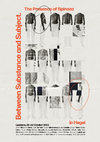
It is hard to overestimate the family resemblances between the exposition of Hegel’s Idea and the... more It is hard to overestimate the family resemblances between the exposition of Hegel’s Idea and the expression of Spinoza’s substance. The “eternal Idea”, one reads at the end of the Encyclopaedia, “eternally remains active, engenders and enjoys itself” (§577). Similarly, blessedness for Spinoza consists in “Love of God, a Love which arises from the third kind of knowledge [and] must be related to the Mind insofar as it acts” (Ethica V, D42). Pivotal in the shared emphasis on activity is how these activities are differently achieved and performed. While Spinoza expounds a direct proportionality between adequate cognition and activity, according to Hegel philosophy seems to imply an attitude that is coupled with passivity – or even violence: it is “thought determinations” that have us “in [their] possession” (GW 21, 14). In this paper, I want to challenge this reading by confronting Spinoza’s thesis of the Mind actively enjoying divine Love and Hegel’s science as “absolute Bildung and discipline of consciousness”. Through the exam of some key features of Spinoza’s and Hegel’s methods, and of the shared understanding of science as implying emendatio, I aim to clarify the different kinds of ‘activity’ of adequate cognitions by means of their irreducibility to ‘activism’ and ‘objectivism’. This will eventually shed further light on the question of the actuality of cognition and, above all, of true freedom and philosophy.
The International Conference "Between Substance and Subject. The Presence of Spinoza in Hegel" will take place on October 26th-28th, 2023, at the University of Ljubljana (Academy of Theater, Radio, Film and Television AGRFT, Aškerčeva cesta 5).
The event is organized by Giovanna Luciano (Padua), Martin Hergouth (Ljubljana), Luca Illetterati (Padua), Bojana Jovićević (Ljubljana), Zdravko Kobe (Ljubljana), Goran Vranešević (Ljubljana), together with the Internationales Netzwerk Hegels Relevanz.
https://www.speculativethought.com/between-substance-and-subject-the-presence-of-spinoza-in-hegel
1st Berlin-Padua DAAD Workshop on Classical German Philosophy “Encountering Objectivity. Reality ... more 1st Berlin-Padua DAAD Workshop on Classical German Philosophy “Encountering Objectivity. Reality and Cognition between German Classical Philosophy and Contemporary Debates” (Berlin, 10-11 July 2023).
The workshop will take place at Freie Universität Berlin (Altensteinstr. 15, Raum 003B) on July 10th-11th, 2023, and is organized by Karen Koch, Elena Tripaldi, Dina Emundts, and Luca Illetterati.
The workshop is the first meeting of the DAAD Hochschuldialog mit Südeuropa project “Encountering Objectivity. Reality and Cognition between German Classical Philosophy and Contemporary Debates“, whose aim is to investigate the notion and understanding of objectivity in view of the inevitably situated standpoint of human cognition, bridging the gap between contemporary debates in feminist theory and the posthuman, and Classical German Philosophy.
Hegel Kongress of the Internationale Hegelvereinigung "Das Selbstverständnis der Philosophie und ... more Hegel Kongress of the Internationale Hegelvereinigung "Das Selbstverständnis der Philosophie und ihr Verhältnis zu den (anderen) Wissenschaften", which will take place in Stuttgart (Rathaus Stuttgart, Marktplatz 1) on June 7th-10th, 2023.
The Hegel Kongress is sponsored by DFG, Stadt Stuttgart, and the Frauenförderung des Fachbereichs Philosophie und Geisteswissenschaften der Freien Universität Berlin. It is organized by Julia Christ, Barbara Dober, Dina Emundts, Franck Fischbach, Gunnar Hindrichs, Luca Illetterati, Karen Koch, Yannick Nordwald, Dirk Quadflieg, Robert Stern, and Christina Vollmer.
International workshop "Hegel’s Concept of Philosophy between Logic and Practical Philosophy: Res... more International workshop "Hegel’s Concept of Philosophy between Logic and Practical Philosophy: Research Trajectories across Europe and Latin America", hosted by the University of Padua on January 27-28, 2022. The workshop was organized by Luca Illetterati, Giovanna Miolli and Pablo Pulgar Moya.
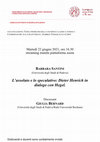
Nell’ambito del tema generale del ciclo di lezioni “Hegel nella filosofia contemporanea”, l’incon... more Nell’ambito del tema generale del ciclo di lezioni “Hegel nella filosofia contemporanea”, l’incontro è dedicato alla presentazione del contributo che Dieter Henrich, come interprete, filosofo, docente universitario e presidente della Hegel-Vereinigung ha dato alla Hegel-Forschung, segnando allo stesso tempo anche una direzione decisiva alla ricerca sulla filosofia classica tedesca e al dibattito contemporaneo sulla modernità. Nell’intervento viene adottata una prospettiva di indagine specifica che si focalizza su un particolare aspetto dell’intenso confronto di Henrich con Hegel: la questione dello speculativo come possibilità di una metafisica dopo Kant. Tale questione permette di discutere l’articolazione di tre livelli di riflessione connessi tra di loro: (1) l’istanza filosofica di Hegel: il problema dell’assoluto, (2) la costellazione post-kantiana: le risorse per la filosofia contemporanea, (3) il pensiero metafisico di Henrich: soggettività e pensieri ultimi. L’incontro si prefigge di far emergere la relazione tra Henrich interprete di Hegel e Henrich filosofo del suo tempo.
Workshop and Conference Organization by Giulia Bernard
Organization: Giulia Bernard, Barbara Santini, Marzia Soavi.
Speakers: Dietmar Heidemann (Uni... more Organization: Giulia Bernard, Barbara Santini, Marzia Soavi.
Speakers: Dietmar Heidemann (Université du Luxembourg), Michela Massimi (University of Edinburgh), Sofie Møller (Universität Köln), Burkhard Nonnenmacher (Universität Tübingen), Annette Sell (Universität Tübingen), Jens Timmermann (University of St Andrews).
The conference is sponsored by the Department of Philosophy, Sociology, Pedagogy and Applied Psychology of the University of Padova.
For both in-person and online attendance, please email kant300.unipd@gmail.com.
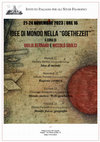
Il concetto di mondo si trova al centro di prospettive che in Germania si sono confrontate con il... more Il concetto di mondo si trova al centro di prospettive che in Germania si sono confrontate con il significato storico della Rivoluzione francese tra la fine del ‘700 e i primi decenni dell’‘800. Nel determinare una nuova idea di ragione, nell’indagare la storicità del regno della libertà e nel ripensare il concetto di natura alla luce delle nuove scienze, gli esponenti della filosofia classica tedesca hanno elaborato maniere differenti di pensare un’idea di mondo che consentisse l’esercizio della libertà intesa in senso cosmopolitico e si prestasse a fornire la base per ripensare radicalmente la totalità. Alla base di ciascuno di questi tentativi di mettere a fuoco il mondo come concetto, come idea, si trova inoltre la possibilità di stabilire una maniera specifica di pensare il rapporto della filosofia alla sua attualità.
Il seminario si terrà in presenza e sulla piattaforma Zoom. Per iscrizioni alla piattaforma Zoom inviare richiesta di adesione all'indirizzo newsletter@iisf.it
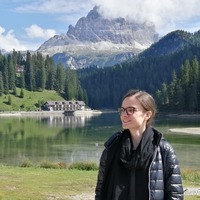
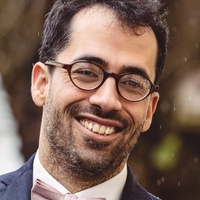


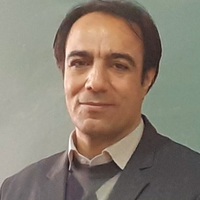



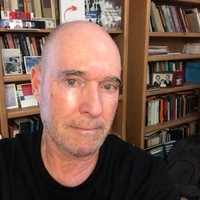

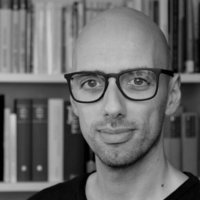
Uploads
Edited Volumes by Giulia Bernard
The concept of speculative thinking is in many ways ambiguous. First, the concept of ‘speculation’ refers, on the one hand, to philosophical research, i.e., to the need for philosophy to remain committed to ‘pure’ thought and not to bend to instances allogenous to conceptual ones, while, on the other hand, it refers to financial transactions, aimed at profiting from fluctuations in market prices.
Second, even within philosophical discourse, the term remains equivocal. At times, ‘speculation’ refers to an inquiry that - precisely by being merely speculative - seems detached from the practical concerns of the world, thereby indicating the essential theoretical element of philosophical inquiry; at others, the term marks the extreme experience of thinking in which ordinary discursiveness touches its limits. After a period of relative oblivion, the notion of the ‘speculative’ has returned today within contemporary philosophical debate.
This special issue focuses on the notion of ‘speculative thinking’, both in its Hegelian and neo-Hegelian interpretations and in contexts that partially diverge from that tradition, aiming to philosophically explore the term’s rich and varied meanings.
Table of contents:
Giulia Bernard, Luca Illetterati, Zdravko Kobe, Speculative thinking: An introduction
I. Speculative, speculative thinking, and dialectics
Gunnar Hindrichs, Il programma speculativo
Angelica Nuzzo, Speculative rationality and its dialectic: Thinking (in) the contemporary world
Quentin Meillassoux, Dialectique spéculative et spéculation non-dialectique. De l’usage d’une négation ésotérique dans l’oeuvre de Hegel
II. Speculative and language
Goran Vranešević, Speculative conception of thought: Hegel on language
Silvia Pieroni, La forma della proposizione speculativa tra scrittura filosofica e traduzione
III. Speculative, speculative materialism, and psychoanalysis
Giovanni Temporin, Meillassoux attraverso lo specchio. Sulla speculazione del materialismo speculativo
Alenka Zupančič, Lacan as speculative thinker?
https://www.rosenbergesellier.it/ita/titolo?ref=1711
Contributions by G. Bernard, L. Fonnesu, M. Glatzel, K. Hong, T. Mauri, B. Santini, S. Schick, M. Tangorra, P. Valenza, D. Vanden Auweele, Y. Xia.
The Introduction of the issue and the essays are available in open access at this link: http://www.verificheonline.net/riviste/reason-in-check-philosophy-of-religion-in-classical-german-philosophy/
Papers by Giulia Bernard
In this paper, I aim to investigate the nuanced role that writing, i.e. the act of articulating and conveying arguments and concepts through textual communication, plays within Kant’s philosophy, particularly in shaping the concept of philosophy and elaborating ways to participate in it. Central to my argument is the assertion that the issue of writing stands as a linchpin for comprehending the exceptionalism inherent in philosophy: the way in which inquiry in philosophy is somehow epistemologically different from inquiry in other disciplines. I show how such a specificity is inextricably intertwined with the ways philosophy is (not) learned. By scrutinizing Kant’s project to substantiate philosophy’s capacity to foster freedom, I contend that a comprehensive exploration of the role of writing is imperative. Through this lens, the interplay between dichotomous concepts – private/public, scholastic/cosmic, and Bildung/science – emerges as pivotal in elucidating philosophy’s exceptionalism and showing how it is linked to the broader Enlightenment-era inquiry concerning participation in critical, emancipatory endeavours.
The concept of speculative thinking is in many ways ambiguous. First, the concept of ‘speculation’ refers, on the one hand, to philosophical research, i.e., to the need for philosophy to remain committed to ‘pure’ thought and not to bend to instances allogenous to conceptual ones, while, on the other hand, it refers to financial transactions, aimed at profiting from fluctuations in market prices. Second, even within philosophical discourse, the term remains equivocal. At times, ‘speculation’ refers to an inquiry that - precisely by being merely speculative - seems detached from the practical concerns of the world, thereby indicating the essential theoretical element of philosophical inquiry; at others, the term marks the extreme experience of thinking in which ordinary discursiveness touches its limits. After a period of relative oblivion, the notion of the ‘speculative’ has returned today within contemporary philosophical debate. This special issue focuses on the notion of ‘speculative thinking’, both in its Hegelian and neo-Hegelian interpretations and in contexts that partially diverge from that tradition, aiming to philosophically explore the term’s rich and varied meanings.
https://www.rosenbergesellier.it/ita/titolo?ref=1711
We are very glad to present this special issue of «Verifiche. Rivista di scienze umane», titled Reason in Check: Philosophy of Religion in classical German philosophy. This issue is devoted to the historical and systematic development of the philosophy of religion within the framework of classical German philosophy.
Talks and Conferences by Giulia Bernard
Speakers include Giulia Bernard (Università degli Studi di Padova), Christoph Binkelmann (Universität Freiburg), Holden Kelm (Berlin-Brandenburgischen Akademie der Wissenschaften), Birgit Sandkaulen (Universität Bochum), Barbara Santini (Università degli Studi di Padova), Stefan Schick (Universität Leipzig), Giulia Valpione (École Normale Supérieure Paris/DePaul University Chicago), David Wood (Universität Bonn)
Panel presented with B. Ancillotti, M. Barnaba, L. deLire, O. Toth, M. Wuth.
The workshop will take place on May 4th-5th, 2024, at the Universität Basel (Alte Universität, Am Rheinsprung 11, Basel).
The event is organized by Karen Koch (Basel), Lucian Ionel (Leipzig).
The International Conference "Between Substance and Subject. The Presence of Spinoza in Hegel" will take place on October 26th-28th, 2023, at the University of Ljubljana (Academy of Theater, Radio, Film and Television AGRFT, Aškerčeva cesta 5).
The event is organized by Giovanna Luciano (Padua), Martin Hergouth (Ljubljana), Luca Illetterati (Padua), Bojana Jovićević (Ljubljana), Zdravko Kobe (Ljubljana), Goran Vranešević (Ljubljana), together with the Internationales Netzwerk Hegels Relevanz.
https://www.speculativethought.com/between-substance-and-subject-the-presence-of-spinoza-in-hegel
The workshop will take place at Freie Universität Berlin (Altensteinstr. 15, Raum 003B) on July 10th-11th, 2023, and is organized by Karen Koch, Elena Tripaldi, Dina Emundts, and Luca Illetterati.
The workshop is the first meeting of the DAAD Hochschuldialog mit Südeuropa project “Encountering Objectivity. Reality and Cognition between German Classical Philosophy and Contemporary Debates“, whose aim is to investigate the notion and understanding of objectivity in view of the inevitably situated standpoint of human cognition, bridging the gap between contemporary debates in feminist theory and the posthuman, and Classical German Philosophy.
The Hegel Kongress is sponsored by DFG, Stadt Stuttgart, and the Frauenförderung des Fachbereichs Philosophie und Geisteswissenschaften der Freien Universität Berlin. It is organized by Julia Christ, Barbara Dober, Dina Emundts, Franck Fischbach, Gunnar Hindrichs, Luca Illetterati, Karen Koch, Yannick Nordwald, Dirk Quadflieg, Robert Stern, and Christina Vollmer.
Workshop and Conference Organization by Giulia Bernard
Speakers: Dietmar Heidemann (Université du Luxembourg), Michela Massimi (University of Edinburgh), Sofie Møller (Universität Köln), Burkhard Nonnenmacher (Universität Tübingen), Annette Sell (Universität Tübingen), Jens Timmermann (University of St Andrews).
The conference is sponsored by the Department of Philosophy, Sociology, Pedagogy and Applied Psychology of the University of Padova.
For both in-person and online attendance, please email kant300.unipd@gmail.com.
Il seminario si terrà in presenza e sulla piattaforma Zoom. Per iscrizioni alla piattaforma Zoom inviare richiesta di adesione all'indirizzo newsletter@iisf.it
The concept of speculative thinking is in many ways ambiguous. First, the concept of ‘speculation’ refers, on the one hand, to philosophical research, i.e., to the need for philosophy to remain committed to ‘pure’ thought and not to bend to instances allogenous to conceptual ones, while, on the other hand, it refers to financial transactions, aimed at profiting from fluctuations in market prices.
Second, even within philosophical discourse, the term remains equivocal. At times, ‘speculation’ refers to an inquiry that - precisely by being merely speculative - seems detached from the practical concerns of the world, thereby indicating the essential theoretical element of philosophical inquiry; at others, the term marks the extreme experience of thinking in which ordinary discursiveness touches its limits. After a period of relative oblivion, the notion of the ‘speculative’ has returned today within contemporary philosophical debate.
This special issue focuses on the notion of ‘speculative thinking’, both in its Hegelian and neo-Hegelian interpretations and in contexts that partially diverge from that tradition, aiming to philosophically explore the term’s rich and varied meanings.
Table of contents:
Giulia Bernard, Luca Illetterati, Zdravko Kobe, Speculative thinking: An introduction
I. Speculative, speculative thinking, and dialectics
Gunnar Hindrichs, Il programma speculativo
Angelica Nuzzo, Speculative rationality and its dialectic: Thinking (in) the contemporary world
Quentin Meillassoux, Dialectique spéculative et spéculation non-dialectique. De l’usage d’une négation ésotérique dans l’oeuvre de Hegel
II. Speculative and language
Goran Vranešević, Speculative conception of thought: Hegel on language
Silvia Pieroni, La forma della proposizione speculativa tra scrittura filosofica e traduzione
III. Speculative, speculative materialism, and psychoanalysis
Giovanni Temporin, Meillassoux attraverso lo specchio. Sulla speculazione del materialismo speculativo
Alenka Zupančič, Lacan as speculative thinker?
https://www.rosenbergesellier.it/ita/titolo?ref=1711
Contributions by G. Bernard, L. Fonnesu, M. Glatzel, K. Hong, T. Mauri, B. Santini, S. Schick, M. Tangorra, P. Valenza, D. Vanden Auweele, Y. Xia.
The Introduction of the issue and the essays are available in open access at this link: http://www.verificheonline.net/riviste/reason-in-check-philosophy-of-religion-in-classical-german-philosophy/
In this paper, I aim to investigate the nuanced role that writing, i.e. the act of articulating and conveying arguments and concepts through textual communication, plays within Kant’s philosophy, particularly in shaping the concept of philosophy and elaborating ways to participate in it. Central to my argument is the assertion that the issue of writing stands as a linchpin for comprehending the exceptionalism inherent in philosophy: the way in which inquiry in philosophy is somehow epistemologically different from inquiry in other disciplines. I show how such a specificity is inextricably intertwined with the ways philosophy is (not) learned. By scrutinizing Kant’s project to substantiate philosophy’s capacity to foster freedom, I contend that a comprehensive exploration of the role of writing is imperative. Through this lens, the interplay between dichotomous concepts – private/public, scholastic/cosmic, and Bildung/science – emerges as pivotal in elucidating philosophy’s exceptionalism and showing how it is linked to the broader Enlightenment-era inquiry concerning participation in critical, emancipatory endeavours.
The concept of speculative thinking is in many ways ambiguous. First, the concept of ‘speculation’ refers, on the one hand, to philosophical research, i.e., to the need for philosophy to remain committed to ‘pure’ thought and not to bend to instances allogenous to conceptual ones, while, on the other hand, it refers to financial transactions, aimed at profiting from fluctuations in market prices. Second, even within philosophical discourse, the term remains equivocal. At times, ‘speculation’ refers to an inquiry that - precisely by being merely speculative - seems detached from the practical concerns of the world, thereby indicating the essential theoretical element of philosophical inquiry; at others, the term marks the extreme experience of thinking in which ordinary discursiveness touches its limits. After a period of relative oblivion, the notion of the ‘speculative’ has returned today within contemporary philosophical debate. This special issue focuses on the notion of ‘speculative thinking’, both in its Hegelian and neo-Hegelian interpretations and in contexts that partially diverge from that tradition, aiming to philosophically explore the term’s rich and varied meanings.
https://www.rosenbergesellier.it/ita/titolo?ref=1711
We are very glad to present this special issue of «Verifiche. Rivista di scienze umane», titled Reason in Check: Philosophy of Religion in classical German philosophy. This issue is devoted to the historical and systematic development of the philosophy of religion within the framework of classical German philosophy.
Speakers include Giulia Bernard (Università degli Studi di Padova), Christoph Binkelmann (Universität Freiburg), Holden Kelm (Berlin-Brandenburgischen Akademie der Wissenschaften), Birgit Sandkaulen (Universität Bochum), Barbara Santini (Università degli Studi di Padova), Stefan Schick (Universität Leipzig), Giulia Valpione (École Normale Supérieure Paris/DePaul University Chicago), David Wood (Universität Bonn)
Panel presented with B. Ancillotti, M. Barnaba, L. deLire, O. Toth, M. Wuth.
The workshop will take place on May 4th-5th, 2024, at the Universität Basel (Alte Universität, Am Rheinsprung 11, Basel).
The event is organized by Karen Koch (Basel), Lucian Ionel (Leipzig).
The International Conference "Between Substance and Subject. The Presence of Spinoza in Hegel" will take place on October 26th-28th, 2023, at the University of Ljubljana (Academy of Theater, Radio, Film and Television AGRFT, Aškerčeva cesta 5).
The event is organized by Giovanna Luciano (Padua), Martin Hergouth (Ljubljana), Luca Illetterati (Padua), Bojana Jovićević (Ljubljana), Zdravko Kobe (Ljubljana), Goran Vranešević (Ljubljana), together with the Internationales Netzwerk Hegels Relevanz.
https://www.speculativethought.com/between-substance-and-subject-the-presence-of-spinoza-in-hegel
The workshop will take place at Freie Universität Berlin (Altensteinstr. 15, Raum 003B) on July 10th-11th, 2023, and is organized by Karen Koch, Elena Tripaldi, Dina Emundts, and Luca Illetterati.
The workshop is the first meeting of the DAAD Hochschuldialog mit Südeuropa project “Encountering Objectivity. Reality and Cognition between German Classical Philosophy and Contemporary Debates“, whose aim is to investigate the notion and understanding of objectivity in view of the inevitably situated standpoint of human cognition, bridging the gap between contemporary debates in feminist theory and the posthuman, and Classical German Philosophy.
The Hegel Kongress is sponsored by DFG, Stadt Stuttgart, and the Frauenförderung des Fachbereichs Philosophie und Geisteswissenschaften der Freien Universität Berlin. It is organized by Julia Christ, Barbara Dober, Dina Emundts, Franck Fischbach, Gunnar Hindrichs, Luca Illetterati, Karen Koch, Yannick Nordwald, Dirk Quadflieg, Robert Stern, and Christina Vollmer.
Speakers: Dietmar Heidemann (Université du Luxembourg), Michela Massimi (University of Edinburgh), Sofie Møller (Universität Köln), Burkhard Nonnenmacher (Universität Tübingen), Annette Sell (Universität Tübingen), Jens Timmermann (University of St Andrews).
The conference is sponsored by the Department of Philosophy, Sociology, Pedagogy and Applied Psychology of the University of Padova.
For both in-person and online attendance, please email kant300.unipd@gmail.com.
Il seminario si terrà in presenza e sulla piattaforma Zoom. Per iscrizioni alla piattaforma Zoom inviare richiesta di adesione all'indirizzo newsletter@iisf.it
Mercoledì 14 giugno 2023
Orario: 9:30
Sede: Sala delle Edicole (Piazza Capitaniato 3)
Angelica Nuzzo (CUNY), The Logic of Nature
Sally Sedgwick (Boston University), Temporality and The Method of Hegel’s Phenomenology
The event is organized by Giovanna Luciano, Giulia Bernard, and Luca Illetterati
The volume Schelling’s philosophy: Freedom, Nature and Systematicity edited by G. Anthony Bruno undoubtedly represents a turning point in this process of appropriation. The book collects twelve essays. Following a canonical periodization of Schelling’s thought, they are divided into four parts that trace the major phases of Schelling’s project. To his «early philosophy» are dedicated Essay 1 (on the Philosophical Letters on Dogmatism and Criticism) and Essay 2 (on On University Studies and his Würzburg Lectures). Essay 3 (on Ideas for a Philosophy of Nature, the On the World-Soul, and his First Outline for a System of the Philosophy of Nature), Essay 4 (on On the World-Soul), Essay 5 (on Presentation of My System of Philosophy), and Essay 6 (on Philosophy and Religion and Freedom Essay) address Schelling’s «philosophy of nature». Essay 7 (on Ideas for a Philosophy of Nature and the First Outline), Essay 8 (on Freedom Essay), Essay 9 (on First Outline and Freedom Essay), Essay 10 (on Ages of the World) are gathered under the label of «philosophy of freedom». Finally, his «late philosophy» is assessed in Essay 11 (on the On the Source of the Eternal Truths) and Essay 12 (on the 1833 Munich Lectures).
As the partial ‘overlapping’ of the commented texts reveals, the labels specifying multiple «phases» of Schelling’s philosophy, although legitimate, are far from univocal. They rather oversimplify a style of thinking which insists on some issues, changing with every opportunity to address them. For this reason, in discussing the contributes, we will follow the set of the arguments and questions rather than their chronological order of exposition.
Il binomio “forms of truth” – o “form of truth”, nella versione al singolare che compare nel titolo – è il centro di una costellazione di istanze sotto cui l’A. organizza 16 contributi pubblicati tra il 2013 e il 2020. “Logic”, “Form”, “Truth”, “Validity” e “Contradiction” intitolano le parti attraverso cui si dipana un’indagine di interesse tanto per chi si dedica alla logica formale e alla sua storia, quanto per chi è interessato ad alcuni dei dibattiti più recenti sulla filosofia hegeliana.
Such a genealogy with Kant alone certainly does not hit the mark, if one recalls Pippin’s Hegel's Idealism published thirty years ago. Unprecedented in Pippin’s interest in the SL is the decision to risk a positive answer to the ‘metaphysical question’ – i.e. to make sense of the statement “logic coincides with metaphysics” (p.39), without thereby renouncing all forms of metaphysics.
The work is engaging and experimental as few books on Hegel’s philosophy are. Combining the “paranoid microscopism of the detail with a preposterous macroscopism of the system” (p.7), the volume rests on an irrepressible duplicity. Two books stand at its centre: The Phenomenology of Spirit and the Science of Logic. The two authors, Comay and Ruda, discuss some of the less palatable issues of Hegel’s work, driven by a deceiving “stupid little observation” (p.6): Hegel punctuates strangely. Two marks of punctuation keep obsessing them – or rather one, a “dash”, that repeats itself at the end of the Phenomenology, detaching Hegel’s text from a (misquoted) epigram by Schiller, and at the beginning of the Logic: “Being, pure Being, –”.
The text is unsettling, and it fails to meet the expectations of those in search of a definitive clue regarding the question of which of the two books should take precedence over the other. Its attempt consists rather of unhinging this interpretative framework and of discussing a constitutive (i.e. unresolved) oscillation between the two works, which allows a reading that views them as different acts of a single play meant to reframe subjectivity against its voluntarist background.
La scelta di rivolgersi al pensiero di un autore tutt’altro che estraneo alle querelle di marca teologica è motivata anzitutto dalla convinzione che la filosofia speculativa sia in grado di inaugurare, con la tematica teologica, un confronto “spiccatamente filosofico, difficilmente superabile per grado di complessità, completezza e sistematicità” (p.4). L’obiettivo perseguito dall’A. è duplice: innanzitutto, rintracciare nella “concezione dell’assoluto puramente logica” approntata dal sistema hegeliano un’opportunità proficua per perimetrare i margini di una “disciplina-limite” (p.1) che ha il proprio baricentro nell’articolazione di un discorso razionale sull’assoluto, e non nella “descrizione di puri stati emotivi” (p. 389). A ciò si affianca, in secondo luogo, una più generale presa di posizione sul compito “fondazionale” della Logica. In questione è qui l’emancipazione del concetto dall’orbita dell’ontoteologia (una forma di sapere che determina l’assoluto come ‘essente’) e l’esplicitazione della sua marcatura epistemologica: come quel discorso, vale a dire, che si compie nell’esame della forma e delle condizioni della sua propria articolazione. Nell’intrecciarsi di questi due intenti, disciplinare e logico-immanente, si misura la posta in gioco ambiziosa di un contributo denso, stimolante sia per chi è interessato al potenziale critico della filosofia hegeliana per ripensare la costellazione degli ‘-ismi’ (teismo, ateismo, panteismo…), sia per chi è alla ricerca di una lettura inedita e puntuale del testo hegeliano.
Angelica Nuzzo pretende di avvicinarsi a questo spettro problematico attraverso un testo che ha ad oggetto la Scienza della logica di Hegel. Il lavoro, dal titolo enigmatico Approaching Hegel’s Logic, Obliquely. Melville, Molière, Beckett, può risultare disorientante sia per coloro che si rivolgono ad esso convinti di trovarvi una trattazione della trasformazione; sia per chi crede di imbattersi ‘soltanto’ in un nuovo commento al testo hegeliano. È forse in questo doppio spaesamento il suo tratto decisamente più significativo e stimolante.
A confermare una simile impressione è l’obiettivo, anch’esso duplice, perseguito da Nuzzo. Da una parte, l’A. si propone di illustrare come la rilettura delle dinamiche logiche nei termini di «figure dell’agire» (p. xiii) consenta di esporre il «pensiero dei processi trasformativi » qua talis, ovvero «ancora prima che siano state specificate le condizioni determinate (naturali, psicologiche, storiche, sociali, politiche, economiche) sotto le quali si realizzano le trasformazioni particolari» (p. 7); dall’altra, l’A. intende dimostrare che l’enfatizzazione del tema della trasformazione risulti produttiva per esplicitare uno strato problematico più profondo e originario del testo logico stesso, rispetto alle sue contemporanee ricostruzioni epistemologiche, metafisiche o anti-metafisiche: quello in cui la dinamica del pensare puro viene esibita nel suo «carattere trasformativo» (p. xiv).
The term ‘speculative’ closely characterizes Hegel’s philosophy, to the point of designating his own philosophical proposal: speculative thinking as opposed to intellectual-abstract and negative-rational thinking, speculative philosophy as a totality of knowledge organized as a system, and speculative logic as departing from transcendental and formal logic are just a few examples that surface when considering Hegel’s philosophy in terms of its differences from other philosophical projects. The term has thus become almost a proper name. And yet it is all but clear what determines the speculative as such: its specific form.
A similar fate seems to have befallen the later revivals of the concept in those who referred to it, in a genealogy directly or indirectly dependent on Hegel. We have seen an increase of interest in the speculative (Alfred North Whitehead, Theodor W. Adorno, Dieter Henrich, Jean-Luc Nancy, Slavoj Žižek) and an upsurge of theoretical proposals that refer back to the speculative (speculative realism, speculative materialism, speculative naturalism), but do so by explicitly distancing themselves from something like ‘speculative thinking’, which in their view represents a legacy to be overcome. The question is: What does speculative thinking actually mean? And in what way do these new conceptions of the speculative succeed in freeing themselves from the allegedly cumbersome burden carried by the term?
This issue of Rivista di Estetica aims at addressing these questions by dwelling on the different uses and meanings of the term ‘speculative’ in Hegel’s philosophy, and the issues that have defined speculative thinking as such. Its scope is to arrive at a conceptual clarification of ‘speculative thinking’ and to examine some of its outcomes in contemporary debate.
Verifiche will publish a special issue devoted to the topic 'Reason in Check. Philosophy of Religion in Classical German Philosophy'. We welcome contributions that investigate philosophy of religion in its historical and systematic development in classical German philosophy, with a specific focus on the models of rationality that are still relevant in contemporary debates on philosophy of religion.